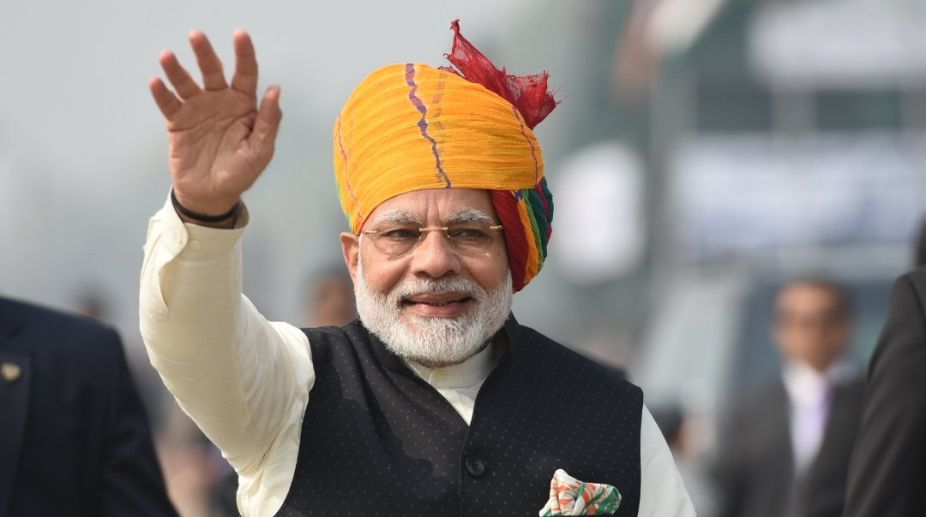R G Kar rape and murder: Victim’s parents to meet CBI chief, Prez Murmu
The parents will leave for Delhi probably on Thursday and meet the director of the CBI probing the brutal rape and murder.

Prime Minister Narendra Modi (Photo: IANS/File)
Prime Minister Narendra Modi on Sunday said “woman power” has contributed a lot to the positive transformation seen in the country and that there were no limits to “Nari Shakti”.
Addressing his monthly “Mann ki Baat” radio programme, the Prime Minister said that relentless efforts towards self-improvement was a feature of Indian society and there have been unending endeavours against social ills.
Advertisement
Modi spent a considerable part of his speech on the present and past achievements of women in several fields and said that, if one possesses the will, determination and firm resolve, “nothing is impossible”.
Advertisement
Quoting a verse from the ‘Skand Puran’, he said it means: “A daughter is equivalent to 10 sons. The ‘punya’ you earn through 10 sons amounts to the same as earned through one daughter. This underscores the importance given to women in our society. That is why, women have been accorded the status of Shakti.”
Modi referred to astronaut Kalpna Chawla, whose death anniversary falls on February 1, and said her life and work is a message to young women, particularly in India, “that there are no upper limits to Nari Shakti….”
“This woman power binds together society, family, on the axis of unity. Be it the erudition of the ‘vidushis’ of Vedic period, woman power has always inspired us. They have always brought glory to the nation,” he said referring to Gargi, Maitreyee, Meerabai, Ahilyabai Holkar and Rani Lakshmi Bai.
The Prime Minister said respect for women in the country, their status in society and their contribution has “proved to be awe-inspiring to the entire world since ancient times”.
He said there were many sectors where women were playing a pioneering role and were establishing milestones and referred to the all-women crew circumnavigating the world, Bhavna Kanth, Mohana Singh and Avani Chaturvedi, who have become fighter pilots and Kshamata Vajpayee who the flew Delhi-San Francisco flight.
He mentioned that Matunga in Mumbai was the first railway station in India managed by women and referred to the daredevil stunts by the BSF women contingent on Republic Day.
The Prime Minister referred to President Ram Nath Kovind meeting a group of women who are pioneers – the “first ladies” in various fields – and said a book has been compiled on them so that the entire country derives inspiration.
Modi lauded this year’s Padma awardees and said common people were being earlier cited for the awards “without any recommendation.”
“There is transparency now in the selection process. More and more ordinary people are getting the awards. You may have noticed many people not visible in big cities, in newspapers or on TV are being awarded Padma citations. Now, the identity of the awardee is not the deciding factor, rather the importance of his work is increasing.”
He also referred to the contributions of some Padma awardees.
Lauding Sitavaa Jodatti from Karnataka and Kerala’s Lakshmikutti, Modi said there were many gifted women and men who remain faceless and failure to recognise them would be a loss to society.
Modi talked of the achievements of overseas Indians and said that the European Union has sent him a calendar which displays contributions of Indians in different countries of Europe.
The Prime Minister said the path preached by Mahatma Gandhi was valid for every individual, family and society.
Lauding the government’s Jan Aushadhi Centres, he said medicines available at over 3,000 centres were 50 to 90 per cent cheaper than branded drugs in the market.
“The sole aim is to ensure availability of quality and affordable health service to the poorest of the poor.”
Referring to the ecology and Clean India mission, Modi lauded the efforts of the people towards cleaning Morna river in Maharashtra.
“Huge social reforms can be brought about through mass movements,” he said.
Modi also appreciated the efforts of the Bihar government in forming the world’s longest human chain, spanning over 13,000 km, against social ills in the state.
Advertisement